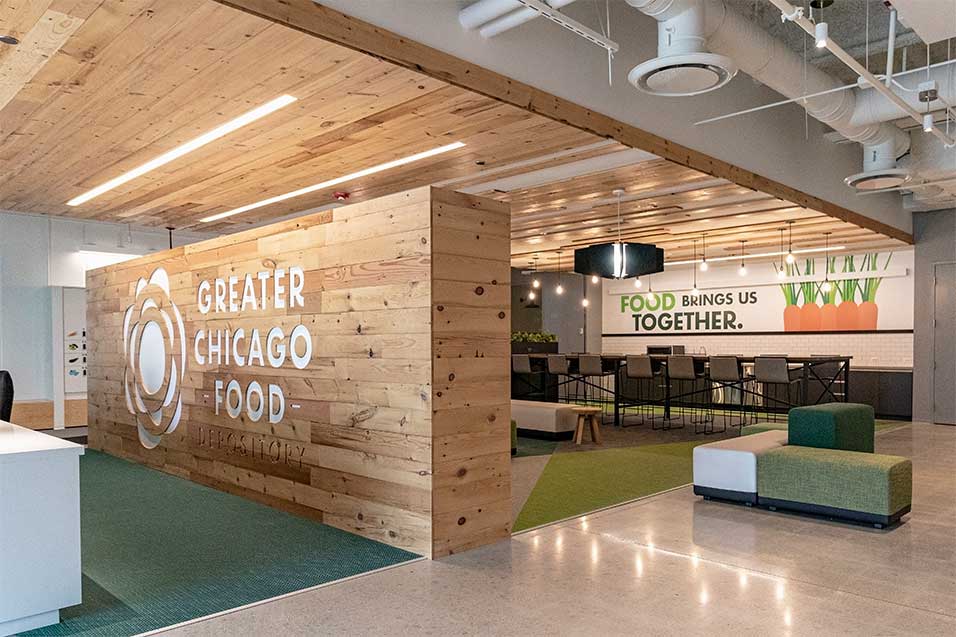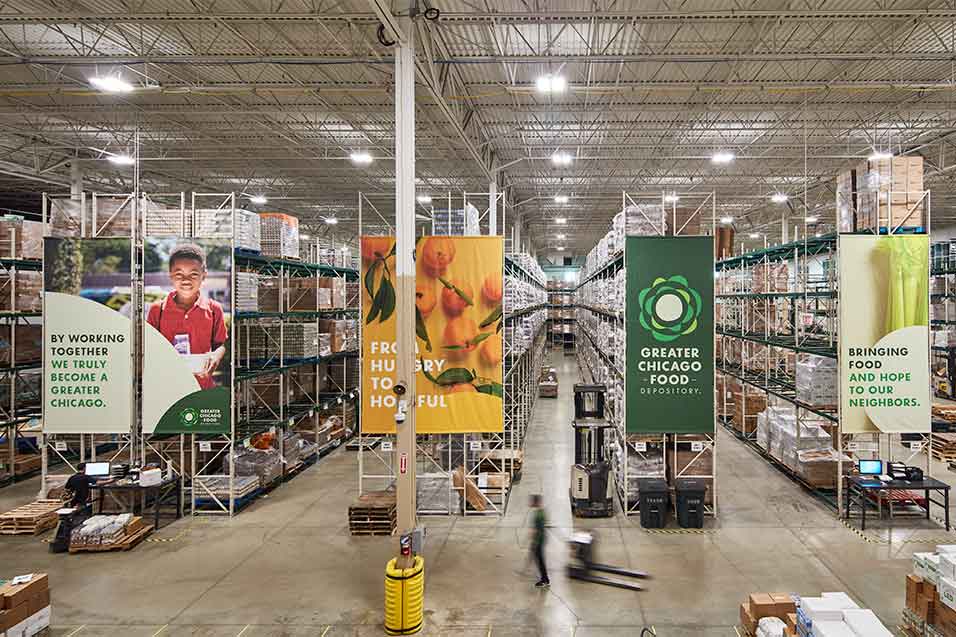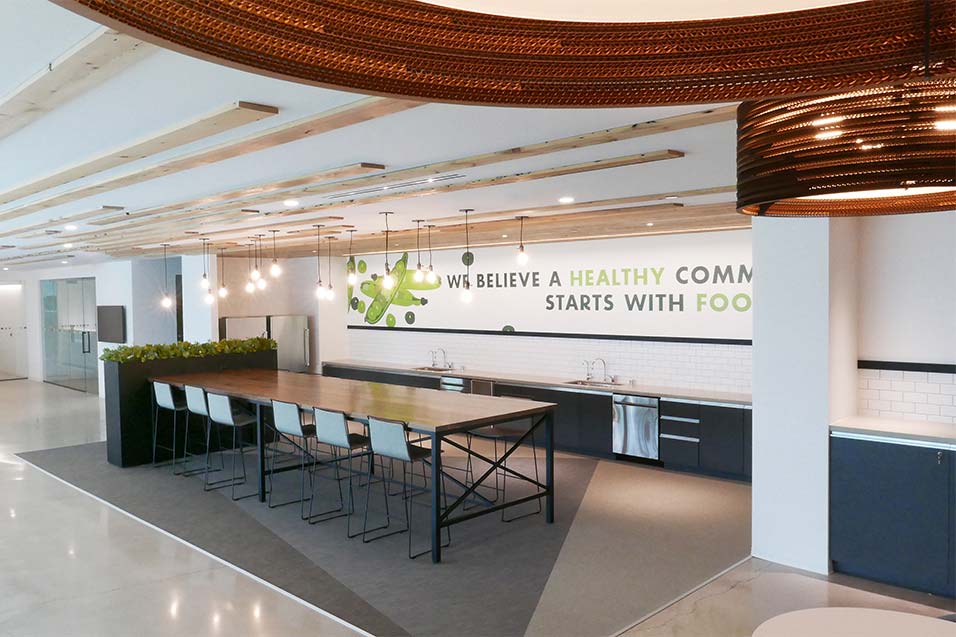JLL helps transform the Greater Chicago Food Depository
Transformation of Chicago’s food bank creates $3 million in savings, optimizes office and cold food storage space, and re-energizes passionate volunteers
Size
270,000 SF
Value
$3 million in cost saves
Spotlight
30% WMBE (women-owned or minority-owned business enterprise) inclusion rate
Enormity of community demand creates need for more space
When the Greater Chicago Food Depository came to JLL to help them transform their office, warehouse and volunteer facilities to be more efficient and effective - they weren’t really thinking about renovating their space. At the outset of the project, Executive Director & CEO Kate Maehr, recalls thinking space wasn’t that important. By the end of the process, she had completely changed her mind.
“I think people walk into this building and they are struck by the enormity of the need,” reflected Kate. “The size of this building and energy when you walk into it speaks to the opportunity to make an impact.”
Founded in 1979, the Greater Chicago Food Depository is a nonprofit organization whose mission is simple yet powerful - to provide food for hungry people while striving to end hunger in the Chicagoland community. A charter member of Feeding America, the Food Depository works with a network of 700 food pantries, soup kitchens, shelters and community programs to serve over 800,000 people every year. That translates into more than 62 million meals with over 38% being fresh produce which means the right food storage space was extremely important especially to expand access to nutritious food.
Additionally, with more than 18,000 passionate volunteers giving more than 82,000 hours to the food depository every year, providing a welcome space for them and all visitors was critical.
“I want this place to be a space where it’s not just the Food Depository’s house our employees’ house, its actually the people’s house, this building is for everybody,” said Nicole Robinson, Vice President of Community Impact for the Greater Chicago Food Depository.
The “Nourish” vision
“Nourish” was the name for the strategic plan the Greater Chicago Food Depository used to describe their ambitious journey to transform their existing facility and operations. The “Nourish” model was about shifting operations to a distribution model so the infrastructure and capacity needed to be updated to accommodate the increase in need.
“They brought us in and said they wanted to completely revamp their space,” said Kirstin Gidzinski, Project Manager for JLL. “It hadn’t been redone since the original building was built.”
“JLL has been a partner of the Food Depository for many, many years,” said Dennis James, Chief Financial Officer for the Greater Chicago Food Depository. “They just seem to rise above everyone else in terms of their response to what we were looking for, their understanding, and their willingness to really sit down and talk about what we were trying to accomplish.”
JLL helped GCFD realize the real opportunities were to not only update and enhance their warehouse and distribution needs but to look at the entire facility to optimize their volunteer center, workplace and operations. The warehouse and its cold storage capacity needed to increase in size to enable the organization to distribute significantly more fresh produce. Additionally, the new volunteer and office workspace needed to be designed to reflect the Food Depository’s mission to bring people together in the fight to end food insecurity.
The renovation outcome
The renovation has allowed for growth, cultivation and connection within not only the volunteers and employees of the organization but the community as well. As part of the Greater Chicago Food Depository’s “Nourish” campaign to end hunger in our community, JLL helped them increased the capacity to store and distribute fresh fruits and vegetables.
“The original warehouse was woefully short of refrigerated and freezer space,” said Dennis. “So, we doubled the size of that.”
“We clearly didn’t have enough cold storage space,” said Sheila Creghin, Vice President of Operations for the Greater Chicago Food Depository. “Years ago, we used to distribute about 6 million pounds of fresh produce and we just finished this year at over 27 million pounds of fresh produce. Have we not had the additional cold storage space that would have been a struggle.”
JLL and the architect included all leadership and employee groups in the programming to ensure their vision for the space was captured. They wanted to make sure the mission of the Greater Chicago Food Depository was seen not only through space planning, but also material selection and overall feel of the space. The result is the new volunteer center improves the overall experience and creates a sense of community for all youth and families. Overall, the newly renovated facility stresses the importance that space matters to engage employees, volunteers and visitors.
“It was critical to find the right partner to do this,” said Kate. “The vision that JLL helped us to see and articulate was to make this building a destination not just for employees and volunteers but also for an industry that has deep connection with the Greater Chicago Food Depository.”
“At every design meeting I was saying how can we make sure that their mission comes through?” said Kirstin. “We wanted to make sure that it was all very inclusive to make people feel comfortable to be here. It’s just a natural down to earth kind of space.”
The design features a lot of shiny pallet wood, and even the graphic logo is supposed to look like people sitting around a table together. The new workspace features plenty of open space for meeting, gathering, and visiting with volunteers and the community. Most notably, the two-story atrium is utilized as the employee café area featuring three separate dining areas, two coffee bars, and enough space for an organization-wide town hall. Balancing these features are individual pods, booths, and dedicated workstations throughout the space for solitary, quiet work. The office area includes 200 workstations and 12 private offices. Amenity spaces include three employee cafes, a gym, mother’s rooms, meditation room, volunteer lounge, outdoor patio. The workspace is adjacent to the warehouse and even includes some lofted windows to see into the warehouse, ensuring the two spaces aren’t too separated.
It takes a village
The commercial real estate industry in Chicago has a long history of supporting the Greater Chicago Food Depository, dating back to over 32 years ago when the Commercial Real Estate Awards benefiting the Food Depository was founded. When the call came, all of our project partners stepped up.
JLL found temporary office space – donated by a landlord - for the Greater Chicago Food Depository office team to temporarily relocate to save time and avoid disruption in the project schedule. But that donated office space was just the start. A variety of community partners donated goods and services equivalent to 16 percent of the project costs.
“We had over 3 million dollars of cost saves of donated products, donated services and time,” said Kirstin. “That’s just amazing.”
The project also had an amazing 30 percent WMBE (women-owned or minority-owned business enterprise) inclusion rate.
“Our role was to take a step backward, look at the big picture and really think about the mission first,” said Margie Baran, SVP, Midwest Business Development for Project and Development Services at JLL. “I think it’s something to be really proud of. Working at JLL, they allow us to do projects like this, not just the project part – but the giving back part.”
“One of our colleagues, I remember when I took her on the tour she was very quiet,” Joan Chow, Chief Marketing Officer, the Greater Chicago Food Depository. “At the end of the tour I pulled her aside and said, are you ok, is there something you don’t like? And she said I was about to cry, I’m speechless. This is so beautiful.”
Looking to the organization's future
With a growing need to end hunger, this primary mission for the Greater Chicago Food Depository is still driving the project and adding new services to the community. And as a result of the pandemic, the Greater Chicago Food Depository continues to react to the immense increase in need throughout Chicagoland.The visitor center, workplace and warehouse transformation was just the beginning. In 2019, Greater Chicago Food Depository and JLL embarked on another major project to build an event/education space and a meal preparation facility to prepare over 25,000 meals a day to help the senior citizens and aging baby boomer population. The organization will continue to offer and grow its current programs but wants to emphasize the importance of human factors in the meal production process and provide additional jobs in the area.
“In some ways what the reinvigoration of this building has done,” said Kate, “is it’s also re-energized us in this mission and in this fight. Our work is not over as long as there is anybody in this great city who faces hunger. And so we’ve got work to do and we’re looking forward to doing it in this amazing space.”













